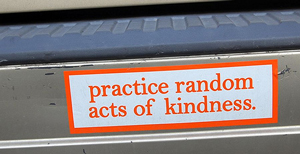
Source: Random Acts, MTSOfan, Flickr
Johann Wolfgang von Goethe wrote that “Kindness is the golden chain by which society is bound together.” The central message of kindness links the media and literature in this lesson.
Both Harper Lee and John Irving are writing as adults but sharing their perspectives as children. It’s only natural that their perspectives would change as they mature. As an adult, Scout realizes that Boo Radley is not a monster in exile but a kind recluse. As an adult, John Irving regrets his cruelty. He is so upset when Piggy Sneed dies in a fire at the pig farm that he imagines Piggy’s elaborate escapes to Europe or Florida. His grandmother chastises him by saying, “You could have saved yourself a lot of bother if you’d only treated Mr. Sneed with a little decency when he was alive.”
In a convocation speech at Syracuse University in 2013, George Saunders recalls an incident from his childhood reminiscent of Harper Lee and John Irving’s experiences. He shares his regret with the graduates:

Source: Kindness, David King, Flickr
In seventh grade, this new kid joined our class. In the interest of confidentiality, her Convocation Speech name will be “ELLEN.” ELLEN was small, shy. She wore these blue cat’s-eye glasses that, at the time, only old ladies wore. When nervous, which was pretty much always, she had a habit of taking a strand of hair into her mouth and chewing on it.
So she came to our school and our neighborhood, and was mostly ignored, occasionally teased (“Your hair taste good?” – that sort of thing). I could see this hurt her. I still remember the way she’d look after such an insult: eyes cast down, a little gut-kicked, as if, having just been reminded of her place in things, she was trying, as much as possible, to disappear. After awhile she’d drift away, hair-strand still in her mouth. At home, I imagined, after school, her mother would say, you know: “How was your day, sweetie?” and she’d say, “Oh, fine.” And her mother would say, “Making any friends?” and she’d go, “Sure, lots.”
Sometimes I’d see her hanging around alone in her front yard, as if afraid to leave it.
And then – they moved. That was it. No tragedy, no big final hazing.
One day she was there, next day she wasn’t. End of story.
Now, why do I regret that? Why, forty-two years later, am I still thinking about it? Relative to most of the other kids, I was actually pretty nice to her. I never said an unkind word to her. In fact, I sometimes even (mildly) defended her.
But still. It bothers me.
George Saunders was not as mean as Irving or as inventive as the Finch children, but he certainly regrets his treatment of the outsider who wore unfashionable glasses.
Which statements below describe events that are similar to those found in the speech above, To Kill a Mockingbird, and Trying to Save Piggy Sneed? Click on all that apply.

Reader Response:
 In this lesson, you read excerpts from a novel, a memoir, and a speech describing how outcasts suffer. As you expand your understanding of the human condition by reading connecting texts, you start to see the world differently, and perhaps gain better insight into yourself. Using your notes, answer the following question using textual evidence. When you are finished, check your answer by clicking on Check Your Understanding to see a sample answer.
In this lesson, you read excerpts from a novel, a memoir, and a speech describing how outcasts suffer. As you expand your understanding of the human condition by reading connecting texts, you start to see the world differently, and perhaps gain better insight into yourself. Using your notes, answer the following question using textual evidence. When you are finished, check your answer by clicking on Check Your Understanding to see a sample answer. All three texts have examples of children imagining things about the outcasts. Using two of the three texts, provide textual evidence of what the children imagine about the outcast characters, and discuss what those imagined things say about the children who imagine them.
The children of Maycomb imagine really terrible things about Boo--he commits crimes, and he mutilates pets. The children imagine that Piggy eats his pigs for dinner when he’s hungry, and George Saunders imagines that Ellen tells her mother that she has made friends at school. These imagined things tell the reader that the children of Maycomb might really be afraid of Boo. They rarely see him, so they are free to imagine all kinds of things. The children who tease Piggy imagine that he eats a whole pig when he’s hungry because it’s easy for them to make that assumption. They’re not being very clever, just adding to the pig-like qualities of Piggy. George imagining that Ellen told her mom she had friends shows that as a child he had sympathy for her; he wanted her life to be better than it really was.